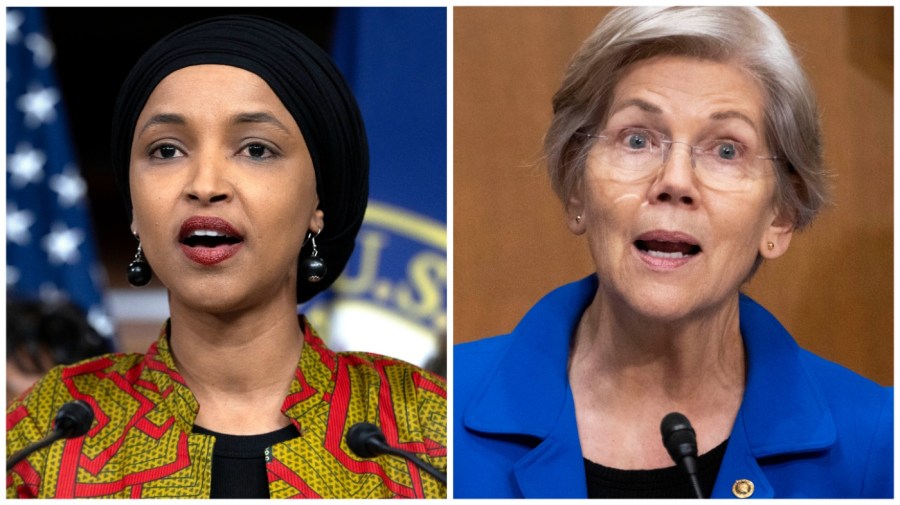
A group of Democratic lawmakers in the House and Senate are calling on heads of the Treasury Department, Federal Reserve Board and other financial regulators to ensure equitable banking access for Muslim Americans and immigrants
Sen. Elizabeth Warren (D-Mass.) and Rep. Ilhan Omar (D-Minn.) — in a letter sent Wednesday to Treasury Secretary Janet Yellen, Federal Reserve Board Chair Jerome Powell and other regulatory leaders — argued the anti-money laundering and financial crime prevention policies practiced at the agencies could be disproportionately impacting Muslim Americans.
These anti-money laundering practices are often known as “de-risking,” and refer to when financial institutions terminate or limit business relationships with big groups of customers.
“The threat of de-risking is especially stark for customers from the Muslim American community. Financial institutions may consider Muslim and Arab, Middle Eastern, and South Asian Americans ‘high risk,’ potentially erroneously, when sending payments or remittances abroad or donating to charities or religious institutions,” the lawmakers wrote in the May 15 letter.
In a study last year by the Institute for Social Policy and Understanding, more than a quarter of Muslim Americans reported challenges when banking, the highest out of any demographic group.
“De-risking can also undermine the stability and sustainability of countries that depend on remittances for economic development,” the lawmakers wrote, pointing to a piece on how the de-risking trend “harms” nations that are reliant on remittances.
Other signatories on the letter include Sens. Ed Markey (D-Mass.), Bernie Sanders (I-Vt.) and Reps. Rashida Tlaib (D-Mich.), Katie Porter (D-Calif.) and Barbara Lee (D-Calif.), Alexandria Ocasio-Cortez (D-N.Y.), Pramila Jayapal (D-Wash.), Joyce Marie Beatty (D-Ohio) and Jonathan Jackson (D-Ill.).
The lawmakers pointed to a New York Times report last December on how hundreds of customers reported on major financial institutions shutting down their accounts without warning in an effort to prevent suspicious activity.
While applauding the Treasury Department for its de-risking strategy, released in April of last year, which outlined ways to prevent de-risking, the lawmakers argued more could be done.
They proposed federal agencies issue a joint statement affirming how financial inclusion is a “public priority” for anti-money laundering policy and establish a formal, domestic advisory group on financial inclusion that includes representatives from each agency.
The lawmakers also recommended issuing more specific guidance for banks on which situations merit account closure. They asked the Treasury Department to require financial institutions to have a process for customers to submit proof to show a transaction is legitimate if they are worried it will raise flags.
They also asked the Consumer Financial Protection Bureau to enforce the statues that guarantee customers are given adequate notice and resources when their accounts are unexpectedly closed.
In announcing its de-risking strategy last year, the Treasury Department said de-risking “undermines several key U.S. government policy objectives.”
“This strategy reflects the Biden-Harris Administration’s priority to shape a safer, more transparent, and more accessible financial system, while at the same time maintaining a robust framework to protect the U.S. financial system from illicit actors and bolstering national security,” the Treasury Department said at the time.
Other recipients of the letter included Federal Deposit Insurance Corporation Chair Martin Gruenberg, Crimes Enforcement Network Director Andrea Gacki, National Credit Union Administration Chair Todd Harper, Consumer Financial Protection Bureau Director Rohit Chopra and Michael Hsu, the acting chief of the Office of the Comptroller of the Currency.
The Hill reached out to the respective agencies for comment.
Concerns over anti-Muslim incidents in the U.S. have been further sparked amid the ongoing Israel-Hamas war in Gaza, where more than 35,000 Palestinians have been killed, per local health officials.
Over 8,000 anti-Muslim complaints were recorded across the nation last year, marking the highest total in the 30 years the Council on American-Islamic Relations (CAIR) has tracked the complaints.
CAIR received the most complaints in the final three months of last year, shortly after militant group Hamas launched a surprise incursion in Israel that left about 1,200 people dead.














